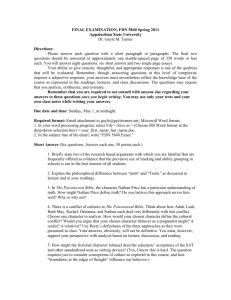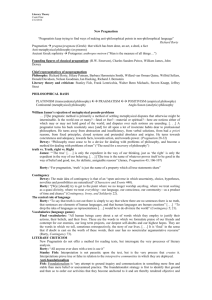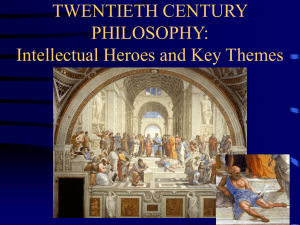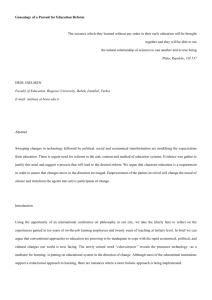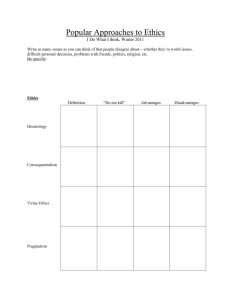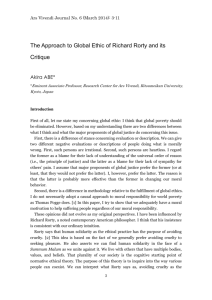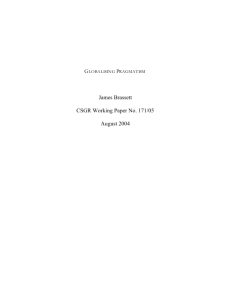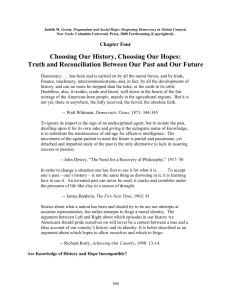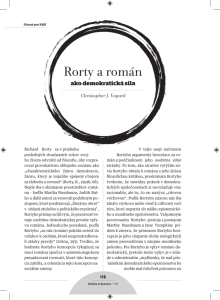The Passing of Richard Rorty and the Future of American Philosophy
advertisement
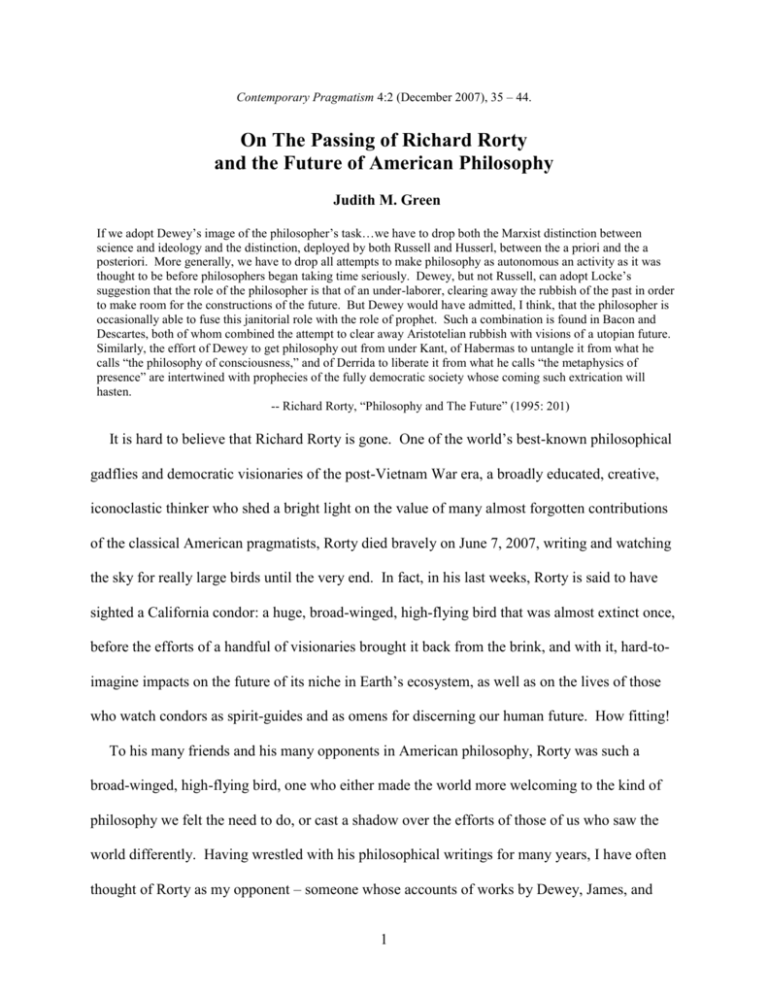
Contemporary Pragmatism 4:2 (December 2007), 35 – 44. On The Passing of Richard Rorty and the Future of American Philosophy Judith M. Green If we adopt Dewey’s image of the philosopher’s task…we have to drop both the Marxist distinction between science and ideology and the distinction, deployed by both Russell and Husserl, between the a priori and the a posteriori. More generally, we have to drop all attempts to make philosophy as autonomous an activity as it was thought to be before philosophers began taking time seriously. Dewey, but not Russell, can adopt Locke’s suggestion that the role of the philosopher is that of an under-laborer, clearing away the rubbish of the past in order to make room for the constructions of the future. But Dewey would have admitted, I think, that the philosopher is occasionally able to fuse this janitorial role with the role of prophet. Such a combination is found in Bacon and Descartes, both of whom combined the attempt to clear away Aristotelian rubbish with visions of a utopian future. Similarly, the effort of Dewey to get philosophy out from under Kant, of Habermas to untangle it from what he calls “the philosophy of consciousness,” and of Derrida to liberate it from what he calls “the metaphysics of presence” are intertwined with prophecies of the fully democratic society whose coming such extrication will hasten. -- Richard Rorty, “Philosophy and The Future” (1995: 201) It is hard to believe that Richard Rorty is gone. One of the world’s best-known philosophical gadflies and democratic visionaries of the post-Vietnam War era, a broadly educated, creative, iconoclastic thinker who shed a bright light on the value of many almost forgotten contributions of the classical American pragmatists, Rorty died bravely on June 7, 2007, writing and watching the sky for really large birds until the very end. In fact, in his last weeks, Rorty is said to have sighted a California condor: a huge, broad-winged, high-flying bird that was almost extinct once, before the efforts of a handful of visionaries brought it back from the brink, and with it, hard-toimagine impacts on the future of its niche in Earth’s ecosystem, as well as on the lives of those who watch condors as spirit-guides and as omens for discerning our human future. How fitting! To his many friends and his many opponents in American philosophy, Rorty was such a broad-winged, high-flying bird, one who either made the world more welcoming to the kind of philosophy we felt the need to do, or cast a shadow over the efforts of those of us who saw the world differently. Having wrestled with his philosophical writings for many years, I have often thought of Rorty as my opponent – someone whose accounts of works by Dewey, James, and 1 Wittgenstein that I know well and care about were wildly unreliable, and whose influential views about many philosophical issues on which I, his junior, also work cast a large shadow over these fields that sometimes made it hard for me to find daylight. And yet, I am mindful of how liberating many of his philosophical writings have been to many gifted American philosophers, and how empowering his presence often was to many of our colleagues in Eastern Europe and Latin America who could fund conferences and publish their work because he agreed to come. Therefore, I decided to read Rorty again during the summer after his death, as I was revising my own book on pragmatism and social hope for publication. To my surprise, I learned a lot. When I challenged Rorty at a professional conference on “public sociology” in San Francisco during the summer of 2004 to use his fame as a platform for launching active, collaborative efforts of “public philosophy,” he grumbled, “No one listens to me, anyway.” How odd that he would think that, when I have heard his work discussed in Germany, Poland, Italy, and China, as well as throughout the United States. When I reminded him that Achieving Our Country (1998) had been a non-fiction best-seller, widely read by other educated readers as well as philosophers, he replied that maybe he had tended to separate his philosophical voice too much from his voice as a citizen. I had to smile. One of the great things about Rorty’s philosophical writing was that it was so close to and honest about his life, not only in poignant autobiographical essays like “Trotsky and the Wild Orchids,” and in works on politics and culture like Contingency, Irony, and Solidarity (1989), Achieving Our Country (1998), Philosophy and Social Hope (1999), and Philosophy as Cultural Politics (2007), but also in late-life dialogues with other international philosophers, including The Future of Religion (2005) with the Italian hermeneuticist philosopher, Gianni Vattimo, and What’s the Use of Truth (2007), with the French analytic philosopher, Pascal Engel. Even the 2 work that first made him famous, Philosophy and the Mirror of Nature (1979), was really a manifesto about why Rorty felt the need to part ways with analytic philosophy in order to write something better: “Philosophy in the Conversation of Mankind,” as he entitled the last chapter. Conversation was Rorty’s “thing,” the best thing we language-using beings could do, in his view – the best way to end cruelty and the best way to enjoy the sheer pleasure of our own distinctive voices, as well as the voices of others among the living and the dead who have something to say and can say it well. “Conversation-stoppers” were what he tried hardest to get out of “the public square,” whether these were the authoritarian languages of organized religions, the abstractions about power of Foucault and “postmodernists,” or the “hot air” of contemporary epistemology that he thought was incapable of elevating our perspectives enough to let us see the wider plain of future choices before us as individuals, as a national culture, and as philosophers. Trailing after him now that he is gone, reading works that I missed or read from a different, more combative angle before, I find that I still disagree with him about many issues on which I wish I could still challenge him to reply. My purpose here is to celebrate Rorty’s life in the spirit of an Irish wake, not by recounting old battles, but by continuing to argue with him about “Philosophy and the Future.” This is the title of a 1995 essay he wrote in reply (sort of) to the very able criticisms of a group of American philosophers who argued that he (and we) would do better to work closer to the various methods and insights of the classical American pragmatists than to his “neo-pragmatism” on most of the philosophical subjects that are still worth writing about. Drawing on Rorty’s “reply” to them as well as other works that I have recently re-read with benefit, and now find importantly right or importantly wrong, I aim to propose an agenda for our future work. 3 My recent reading of Rorty’s legacy suggests that his adult life and his philosophical writings were framed by four key commitments: 1. To the Trotskyite political “religion” of his upbringing and those who shared it; 2. To diverse intellectual and existential heroes, whom he listed and quoted throughout his works, including Galileo, Keats, Hegel, Whitman, James, Dewey, Nietzsche, Freud, Yeats, Heidegger, Proust, Wittgenstein, Sellers, Davidson, and Bloom, as well as Howe and Randolph, to whose memories he dedicated Achieving Our Country; 3. To his utopian ideal of “Western bourgeois liberal democracy” as contingent, fragile, nonuniversal, deliberative, limiting cruelty, protecting the private sphere of individual liberty, expanding human solidarity, equalizing opportunities, and assuring economic justice; and 4. To the life of the “Strong Poet” – self-creative, autonomous, paradigmatic, making new language, and thereby changing the world. These commitments did not so much follow as conclusions from Rorty’s philosophical views as motivate them. That is, Rorty’s philosophical views, always explained with erudite references to the history of philosophy as well as up-to-date comments on contemporary debates, always aimed to create – and to persuade others to accept – a coherent network of views that worked to support those four commitments that flowed from remembered loyalties and utopian visioning. Taken together, the bold philosophical views that Rorty advanced during his last thirty years constitute a twelve-point manifesto that is well worth debating with him as a partial agenda for the future of American philosophy: 1. The Public-Private Divide 2. Languages as Contingent, World-Making, Time-Bound, Non-Translatable 3. Non-Teleological Historicist Contextualism 4 4. Anti-Religious, Self-Creative Ironism 5. Metaphysical Nominalism 6. Culture-Specific, Non-Universal Social Ethics 7. Dissolution, Not Resolution of Persisting Philosophical Problems 8. Anti-Methodist Contextualism 9. The Uselessness of Truth 10. Poetry, not Science, as a Model for Philosophy 11. Western Bourgeois Liberal Democracy as a Local Utopian Dream-Vision 12. Cruelty-Preventing Human Solidarity as Made, not Given All of these are philosophical issues that will make a difference to the public deliberations and contestations that are already shaping our future, nationally and globally, as well as to the kinds of lives we and others will choose, and will seek both opportunities and companions to actualize. On each of these issues, Rorty the prophet offered thoughtful and provocative comments to get us into a conversations about the future. Yet on each of these issues, I think he was importantly wrong, and I plan to continue to say so as part of my own appreciative “pragmatist piety” toward him as a Deweyan philosopher-janitor who both cleared up a lot of rubble from the past, and also left a lot behind him.i Perhaps because he, like James and a lot of the rest of us, struggled with depression, Rorty thought it was important to keep a sense of perspective and a sense of humor about the limits of our own understanding of what’s going on, not only in the world but in our own experience of living. So I’m sure he had to laugh in retrospect, as I did when I came across it, about this passage from “Philosophy and the Future”: We philosophers are good at building bridges between nations, at cosmopolitan initiatives, but not at telling stories. When we do tell stories, they tend to be bad 5 ones, like the stories that Hegel and Heidegger told the Germans about themselves—stories about the superior relation in which a certain country stands to some supernational power. (Saatkamp 1995: 203) Two years later, Rorty gave the lectures that formed the core of Achieving Our Country, in which he invoked the companion spirits of Whitman, James, and Dewey to start the process of telling a “new American story” that he said was so urgent that we should give up philosophy (at least the abstract and “hot air” kinds) to help him tell it to the American public, especially to the labor unions, in order to get them to join with us in a series of campaigns to achieve economic justice and equal opportunity – before globalization and backlash kill the dream of democracy. Whatever the deficiencies of the “American dream-story” he offered as a starting place for this process, Rorty was prophetic about our need now for a motivating story with enough humaneness, realistic depth, and historical truth to challenge and overrule the rival post-9/11 stories told by our elected leaders and by the authoritarian terrorists with whom they have gone to war, each claiming to be making greater progress toward eventual victory. Unfortunately, however, Rorty denied that humaneness, realistic depth, and historical truth are possible in a story. For Rorty the “nominalist,” as much as for Samuel P. Huntington (1996, 2004), there are no common, cross-cultural ethical standards of humaneness – only how “we” see things as “Western bourgeois liberals” and how others see things, often differently, with no common human nature, and thus, no Kantian universal rationality to serve as a common ground for the universal human rights on which Seyla Benhabib (2006) and other critical theorists have focused their democratic hopes for the future. There is no objective perspective on reality, said Rorty the “neo-pragmatist,” and thus, no relative depth, distortion, or shallowness in our claims about it. There is no truth of history, said Rorty the “historicist,” because there is no way to get out of the 6 limits of our time and place, which are profoundly unlike other times and places. There is no divine plan to make sense of our present suffering and to guarantee a better future – and this is a good thing, said Rorty the “ironist,” because this is the prerequisite for the self-creative freedom of “strong poets” to shape personally meaningful individual lives, as well as a nation unlike any the world has seen before – America – in which our public democratic solidarity expresses and enhances our private freedom. Although I and many others have read Rorty’s “new American story” as “ethnocentric” – his own term – and assumed that the scope of his hopes for democracy was narrowly national, like Huntington’s, actually he was a cosmopolitan, as he explained in “Philosophy and the Future”: The alternative to [a] spurious and self-deceptive kind of cosmopolitanism is one with a clear image of a specific kind of cosmopolitan human future: the image of a planetwide democracy, a society in which torture, or the closing down of a university or a newspaper on the other side of the world is as much a cause for outrage as when it happens at home. (Saatkamp 1995: 203-204) This is the kind of inclusive democratic thinking that made Rorty beloved in those global contexts in which he showed up because people were being tortured, and newspapers and universities were being shut down. This is the kind of visionary utopianism that made him a “guru” to young scholars wrestling with older philosophies who caught their first whiff of pragmatism from him. However, if our visions are to be more than “utopian” in the pejorative sense that means we can’t get there from here, we must, as Rorty said, “agree with Marx that our job is to help make the future different from the past…contemporary philosophers, like engineers and lawyers, must find out what their clients need” (Saatkamp 1995: 198). What our “clients” desperately need 7 now is for us to act as what Dewey called “liaison officers” among the disciplines and within a set of democratically inclusive, deliberative and participatory public conversations about actually “achieving our country” within the wider cosmopolitan project of “achieving our world” – a world for whose birth James and Dewey, as well as Jane Addams, Alain Locke, and Seyla Behabib can serve as midwifes. This is a world in which a deeper quality of democracy than we have yet achieved within and between cultures and nations, and in the international economy that interlinks them, becomes increasingly the “new history of the world,” in James Baldwin’s prophetic phrase. Because Rorty’s twelve-point manifesto includes philosophical obstacles to our work as liaison officers and midwives for “publics” in America and in other global contexts that are crying to be born, we must reconstruct it to meet our present needs while carrying on our other philosophical conversations about the merits of our various views on many other matters. So here my thumbnail sketch of how to reconstruct Rorty’s manifesto on three key points: nominalism, ironism, and Western bourgeois liberal democracy. 1. Rorty’s particular kind of social “nominalism” is really a metaphysical libertarianism, far removed from the “socialist” low-rise metaphysics that James, Addams, Dewey, Mead, and Alain Locke shared. It treats human individuals as sui generis, denying that “generals” like communities and nations have any real existence, apart from the living actors who make them up. This view is actually inconsistent with Rorty’s views about the world-creating powers of language, which, as Mead pointed out, is individual-penetrating and maybe even “self”-creating – a real thing that emerges in various forms as constitutions as well as works of poetry, star maps, and the music we all remember and use to guide our lives. Though he expressed some embarrassment about Dewey’s use of the 8 word “metaphysic” in a passage he quoted to rebut Rawls’s claim that we can “do” democracy without metaphysical commitments, Rorty himself did metaphysics all the time – even though he also claimed there is no way things really are. But in making this move, Rorty gave up an important kind of critical leverage against his opponents and those we still face, who claim we can impose democracy on other nations and cultures, and that unregulated markets assure individual liberty – two empirically false and harmful views with which Rorty himself disagreed. How can we even talk sensibly as nominalists about the futures of nations, cultures, and the biosphere to which Al Gore has taught millions of members of a new “public” we all really belong? We must do some quick, in-the-field reconstructions of the older, low-rise, “socialist” kind of pragmatist metaphysics and substitute it wherever we can for Rorty’s nominalism, because we need such a pragmatist metaphysics both as a critical tool and as an imagination guide for visioning. 2. Rorty’s anti-religious “ironism” was his expression of anti-authoritarianism, which he took to be the necessary first step for the creative shaping one’s own life, and as the prerequisite and purpose of democracy. It was against Rorty’s intellectual ethics to express even Dewey’s kind of pragmatist piety, because he thought it involved sneaking in the Christian God, or pantheism, or some kind of ancestor-worship by the back door. The Nietzschean label of “ironist” Rorty used for himself evokes heroes in ancient Greek dramas like Oedipus Rex, who followed their own, self-chosen paths without worrying about whether the gods might smite them down for exceeding the limits of human autonomy, and thereby violating divine laws and prerogatives. In later years, in dialogue with Gianni Vattimo, Rorty wrote that he wished that he had described himself as an “anti-clericalist” (a political view) instead of an “atheist” (an epistemological or metaphysical view), because the whole 9 issue of God’s existence just was not a “living” one for him in James’s sense. It was churches he opposed, he said, because they are dangerous to a democratic society. America’s “poetic self-creation,” he argued in Achieving Our Country, requires breaking through previous frames of reference to become “the paradigmatic democracy… in which governments and social institutions exist only for the purpose of making a new sort of individual possible, one who will take nothing as authoritative save free consensus between as diverse a variety of citizens as can possibly be produced,” rejecting castes and classes as incompatible with the self-respect required for “free participation in democratic deliberation” (Rorty 1998: 29-30). Furthermore, Rorty argued, God-talk tends to make trouble in what Cornel West calls “the public square,” both because people worship different deities, and because reliance on any divinity diminishes self-reliance as well as democratic reliance on one another within self-chosen social solidarities.ii However, Rorty’s neo-pragmatist “ironism” now reads as a prescription for disaster, an invitation to think that there is only one possible democratic way of living – the American way, because it is “our” way – and that such a way of living must reject all claims of piety as illegitimate intrusions on individual liberty, attending to no other sources of guidance than those interactively corrected ideas of free individuals that might emerge from democratic deliberation. In any case, how can “our” way even emerge among real ironists? Why would a convinced ironist deliberate? 3. Rorty’s “Western bourgeois liberal” vision of democracy suggests that “we” made it up and no one else can understand it – nor can we understand why they object to it or to various aspects of our culture – and that only middle class, educated people of leisure “get” the importance of democracy. If both the ancient Greeks and the Iroquois 10 Confederacy are among the democracy-creating “we” cultures, as Scott Pratt (2002) says they are, or this seems like a club that any culture can join, as long as they get to do their own dance steps and add their own notes and rhythms, jazz-like, to the basic tune. The important divide is between cultural fundamentalists and cultural cosmopolitans, as Alain Locke (1935) said, and those who insist on maintaining, regaining, or achieving cultural purity are in the grip of an absolutism that rests on a lie. It’s really difficult to negotiate, collaborate, and make peace with such fundamentalists, whatever their particular faith – Christianity, Islam, Judaism, capitalism, communism, or jingoism. The “democratic faith” Dewey, Locke, Addams, and the other classical pragmatists shared is not another “-ism” like these, because its open to learning with and from others, instead of replicating a world in our own image. It works out of an experience-rooted belief that conversation really works and changes us all, who can never be fully private from one another as long as language lasts. Finally, it works out of a sense that a shared biological history, expressed in human bodies transacting within a living world we shape by our actions, just as we are shaped by it, checks what it makes sense to say, giving us a common ground in human feelings, needs, and aspirations to talk, to tell our stories, and perhaps because of these, to collaborate in shaping a shared democratic future. So Richard Rorty, ave et valete, as the ancient Romans used to say – hail and farewell! Let’s toast the world’s more deeply democratic cosmopolitan future and get on with the important work before us: as janitors, prophets, conversation-mongers, public inquirers, liaison officers, hospitality workers, lifters of social hope, and a general reconstruction crew for framing transformation processes that can change the better possibilities we imagine and occasionally glimpse into experienced actualities for all of humanity and our beautiful blue-green planet. 11 Works Cited Benhabib, Seyla. 2006. Another Cosmopolitanism, with Jeremy Waldron, Bonnie Honig, and Will Kymlicka, ed. Robert Post. Oxford: Oxford University Press. Huntington, Samuel P. 1996. The Clash of Civilizations and the Remaking of World Order. New York: Simon & Schuster. -------. 2004. Who Are We? The Challenges to America’s National Identity. New York: Simon & Schuster. Locke, Alain L. 1935. “Values and Imperatives,” The Philosophy of Alain Locke: Harlem Renaissance and Beyond, ed. Leonard Harris. Philadelphia: Temple University Press, 1989. Pratt, Scott L. 2002. Native Pragmatism: Rethinking the Roots of American Philosophy. Bloomington: Indiana University Press. Rorty, Richard. 1979. Philosophy and the Mirror of Nature. Princeton: Princeton University Press. -------. 1982. Consequences of Pragmatism. Minneapolis: University of Minnesota Press. ------. 1985. “Objectivity or Solidarity?” Post-Analytic Philosophy, ed. John Rajchman and Cornel West. New York: Columbia University Press, 3-19. -------. 1989. Contingency, Irony, and Solidarity. Cambridge: Cambridge University Press. -------. 1995. “The Future of Philosophy,” Rorty & Pragmatism: The Philosopher Responds to His Critics, ed. Herman Saatkamp, Jr. Nashville and London: Vanderbilt University Press. ------. 1998. Achieving Our Country: Leftist Thought in Twentieth Century America. Cambridge: Harvard University Press, 1998. ------. 1999. “Trotsky and the Wild Orchids,” Philosophy and Social Hope. New York: Penguin Books. ------- and Gianni Vatimmo. 2005. The Future of Religion, ed. Santiago Zabala. New York: Columbia University Press. ------. 2005. “Philosophical Geniuses and Professional Philosophers.” Annual Meetings of the American Sociological Association (San Francisco, California), August 17. 2005. ------- and Pascal Engel. 2007. What’s the Use of Truth? New York: Columbia University Press. -------. 2007. Philosophy as Cultural Politics. Cambridge: Cambridge University Press. 12 13
